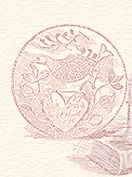Ihr liewe Leit:
Wie gsaat, mer fange do im Abrill unser 22scht Yaahr aa. Awwer wer
vun eich liewe Leser wisst wann un wie die Pennsylvaanisdch Deitsch Lidderadur
aagfange iss? Waer hot die aerscht Gschicht odder es aerscht Gedicht in PD
gschriwwe, un wann waar sell?
Es iss allgemee verschtanne ass der Parre Emanuel Rondthaler, en
Schulmeeschder an Nazareth Hall in Nazareth, Pennsylvaani, es aerscht Schtick
in echtem PD gschriwwe hot. Es waar ‘s aerscht im “Deutscher Kirchenfreund” in
Auguscht 1849 rausgewwe, un der Tiddel war “Abendlied.”
Zwansich Yaahr schpeeder iss es widder rausgewwe warre, desmol
unnerm Tiddel “Maryets un Owets.” Un ferwas hot der gut Parre en Schtick in
Pennsylvaanisch Deitsch schreiwe wolle? Graad fer zu zeige ass es geduh sei
kann, hot er mol seinre Dochder Lisbett gsaat. Un do iss es:
Maryets scheint die Sunn so schee,
Owets geht der geel Mond uff;
Maryets leit der Daa im Glee,
Owets dredt mer drucke druff.
Maryets singe all die Veggel,
Owets greischt die Laabgrott arig:
Maryets globbt mer mit dem Fleggel,
Owets leit mer schunn im Sarrig.
Alles dutt sich ennere do.
Nix bleibt immer so wie nau;
Was em Freeht macht, bleibt net so.
Watt gaar ball arrig hatt un rau.
Drowwe watt es annerscht sei,
Datt wu’s nau so bloh aussicht;
Datt iss maryets alles fei,
Datt iss owets alles licht.
Maryets iss datt Freeht die Fill,
Owets iss es aa noch so;
Maryets iss em’s Hatz so schtill,
Owets iss mer aa noch froh.
Ach, wie dutt’s mich doch gelischde
Nooch der blohe Wohning datt;
Datt mit alle gude Grischde,
Freeht zu hawwe, Ruh alsfatt.
Wann sie mich ins Graab neidraage,
Greint net, denn ich hab’s so schee;
Wann sie “Es iss Owet” saage,
Denkt – bei Ihm iss’s eenerlee!
Neegscht Woch here mer vun “Vadder vun der PD Lidderadur!”
Macht’s gut,
Der Alt Professer
|
Dear people:
As we were saying, we are beginning here in April our 22nd year.
But who of you dear readers know when and how Pennsylvania German
literature began? Who wrote the first story or poem in PG, and when was
that?
In is commonly
understood that Pastor Emanuel Rondthaler, a school master at Nazareth
Hall in Nazareth, Pennsylvania, wrote there first piece in genuine PG. It
was first published in the “German Churchfriend” in August 1849, and the
title was “Evening Song”.
Twenty years later it was published again, this time under the
title “Morning and Evenings.” And why did the good pastor wish to write a
piece in Pennsylvania German? Just to show that it could be done, he once
told his daughter Elizabeth. And here it is:
Mornings the sun shines so nicely,
Evenings the yellow moon rises;
Mornings the dew lies in the clover,
Evenings one steps upon it dry.
Mornings all the birds sing,
Evenings the tree-toad cries terribly;
Mornings you thump with the flail,
Evenings one already lies in the casket.
Everything changes here,
Nothing remains always so like now;
Whatever makes one joyful doesn’t stay like this,
Soon becomes hard and raw.
Up above everything will be different,
There where now things look so blue;
There, everything is fine in the morning,
There, everything is light in the evenings.
Mornings, one has his fill of joy there,
Evenings, it is still that way;
Mornings, one’s heart is so still,
Evenings, one is still happy.
Oh, how I yearn
For the blue abode there;
There with all the good Christians,
To have joy and rest always.
When they carry me into the grave,
Don’t cry, for I have it so nice;
When they say, “It is evening,”
Think – by Him, everything is all the same!
Next week we will hear from the “Father of Pennsylvania German
literature!”
Take care,
The Old Professor
|













